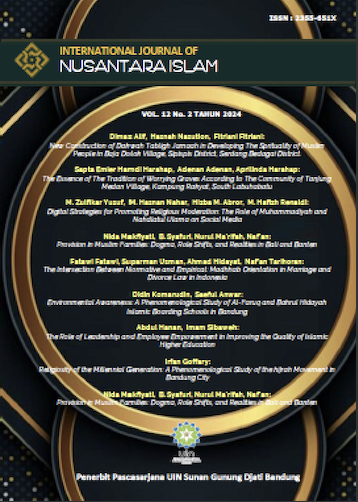The Role of Leadership and Employee Empowerment in Improving the Quality of Islamic Higher Education
Main Article Content
Abstract
Higher education in the Cirebon region faces significant challenges in quality, with higher education institutions such as the Institute Pesantren Babakan and Cirebon facing competition. Factors such as infrastructure, curriculum, teaching methods, and human resources contribute to this gap. This study aims to examine leadership mentoring strategies in empowering lecturers and administrative staff at the Institute Pesantren Babakan, Cirebon, in an effort to improve the quality of higher education. A qualitative-participatory approach was used through Participatory Action Research (PTP) at the Institute Pesantren Babakan, Cirebon. The stages included the process of inculturation, problem formulation, strategic planning, program implementation, monitoring, and reflection. Data collection techniques included participatory action, observation, interviews, and documentation. Data were analyzed using a participation-based qualitative analysis method. The findings show a positive relationship between leadership, empowerment, and improving the quality of education. Effective leadership mentoring strategies include leadership training, managerial development workshops, mentoring sessions, and coaching. A holistic approach to empowering lecturers and staff contributes to increased professionalism, motivation, and quality of education. The evaluation showed a positive impact of leadership mentoring on the empowerment of lecturers and administrative staff in IPEBA. The results showed a positive relationship between leadership practices, empowerment of lecturers and administrative staff, and improved educational quality at IPEBA, recommending the adoption of similar approaches in other institutions to achieve similar improvements in educational quality
Article Details
The Authors submitting a manuscript do so on the understanding that if accepted for publication, copyright of the article shall be assigned to International Journal of Nusantara Islam, Sunan Gunung Djati State Islamic University.
The copyright encompasses exclusive rights to reproduce and disseminate articles in all forms and media, including reprints, photographs, microfilm, and similar reproductions, as well as translations. Some or all of the contents of this journal can be stored in databases and transmitted in any form and media without the need for written permission from the International Journal of Nusantara Islam, Sunan Gunung Djati State Islamic University.
The Editors and the Advisory International Editorial Board make every effort to ensure that no wrong or misleading data, opinions or statements be published in the journal. In any way, the contents of the articles and advertisements published in the International Journal of Nusantara Islam (IJNI) are sole and exclusive responsibility of their respective authors and advertisers.
References
Alainati, S. J., Almonawer, N. S., & Al-Hammad, F. A. (2023). Transformational Leadership in Education: Review of Literature. The International Journal of Business & Management, 2(2), 1-12. https://doi.org/10.24940/theijbm/2023/v11/i2/bm2302-016
Avan, A., Baytok, A., & Zorlu, Ö. (2019). The Effect of Servant Leadership on Psychological Empowerment and Organizational Identification. Journal of Business Research - Turk, 11(1), 293–309. https://doi.org/10.20491/isarder.2019.600
Baird, K., Su, S., & Munir, R. (2018). The Relationship between the Enabling Use of Controls, Employee Empowerment, and Performance. Personnel Review, 47(1), 257–274.
Bodner, S. L. (2003). Dimensional Assessment of Empowerment in Organizations. University of North Texas.
Burke, R. J., Koyuncu, M., Wolpin, J., Yirik, S., & Koyuncu, K. (2015). Organizational Empowerment Practices, Psychological Empowerment and Work Outcomes among Frontline Service Employees in Five-Star Turkish Hotels. Effective Executive, 8(1), 42–65.
Creswell, J. W. (2013). Research Design. Edisi III. Terj. Ahmad Fawaid. Pustaka Pelajar.
DeSouza, G. E., & Beuren, I. M. (2018). Impact of An Enabling Performance Measurement System on Task Performance and Job Satisfaction. Revista Contabilidade & Finanças, 29(77), 194–212.
Ebrahimpour Azbari, M., Akbari, M., & Hooshmand Chaijani, M. (2015). The Effect of strategic leadership and empowerment on job satisfaction of the employees of Guilan University. International Journal of Organizational Leadership, 4(4), 453–464. https://doi.org/10.33844/ijol.2015.60230
Huq, R. (2015). The Psycology of Employee Empowerment: Concepts, Critical Themes, and a Framework for Implementation. Gower Publishing.
Judson, G. (2023). Cultivating Leadership Imagination with Cognitive Tools: An Imagination-Focused Approach to Leadership Education. Journal of Research on Leadership Education, 18(1), 40–62. https://doi.org/10.1177/19427751211022028
Kettunen, K., Alajoutsijärvi, K., Hunnes, J. A., & Pinheiro, R. (2022). Emergence and early institutionalization of competition in higher education: evidence from Finnish business schools. Tertiary Education and Management. https://doi.org/10.1007/s11233-022-09104-9
Krücken, G. (2021). Multiple competitions in higher education: a conceptual approach. Innovation: Organization and Management, 23(2), 163–181. https://doi.org/10.1080/14479338.2019.1684652
Lakomski, G., & Evers, C. W. (2022). The importance of context for leadership in education. Educational Management Administration and Leadership, 50(2), 269–284. https://doi.org/10.1177/17411432211051850
McShane, S. L., & Von Glinow, M. A. (2018). Organizational Behavior - Emerging Realities for the Workplace Revolution. McGraw-Hill Company.
Musselin, C. (2018). New forms of competition in higher education. Socio-Economic Review, 16(3), 657–683. https://doi.org/10.1093/SER/MWY033
Putra, P. E. D. P., & Rahyuda, A. G. (2019). The Role of Job Satisfaction in Mediating Relationship Between Psychological Empowerment and Lecturer Performance. European Journal of Business, Economics and Accountancy, 7(3), 26–37.
Sahraei Beiranvand, M., Beiranvand, S., Beiranvand, S., & Mohammadipour, F. (2021). Explaining the effect of authentic and ethical leadership on psychological empowerment of nurses. Journal of Nursing Management, 29(5), 1081–1090. https://doi.org/10.1111/jonm.13246
Silzer, R., & Dowell, B. E. (2019). Strategy-Driven Talent Management, A Leadership Imperative. Jossey-Bass.
Souza, A., & Leung, A. (2020). Transformative Leadership in Education. Journal of Transformative Leadership & Policy Studies, 8(2), 88–91. https://doi.org/10.36851/jtlps.v8i2.2272
Wen, J., Huang, S., & Teo, S. (2023). Effect of empowering leadership on work engagement via psychological empowerment: Moderation of cultural orientation. Journal of Hospitality and Tourism Management, 54, 88–97. https://doi.org/10.1016/j.jhtm.2022.12.012

